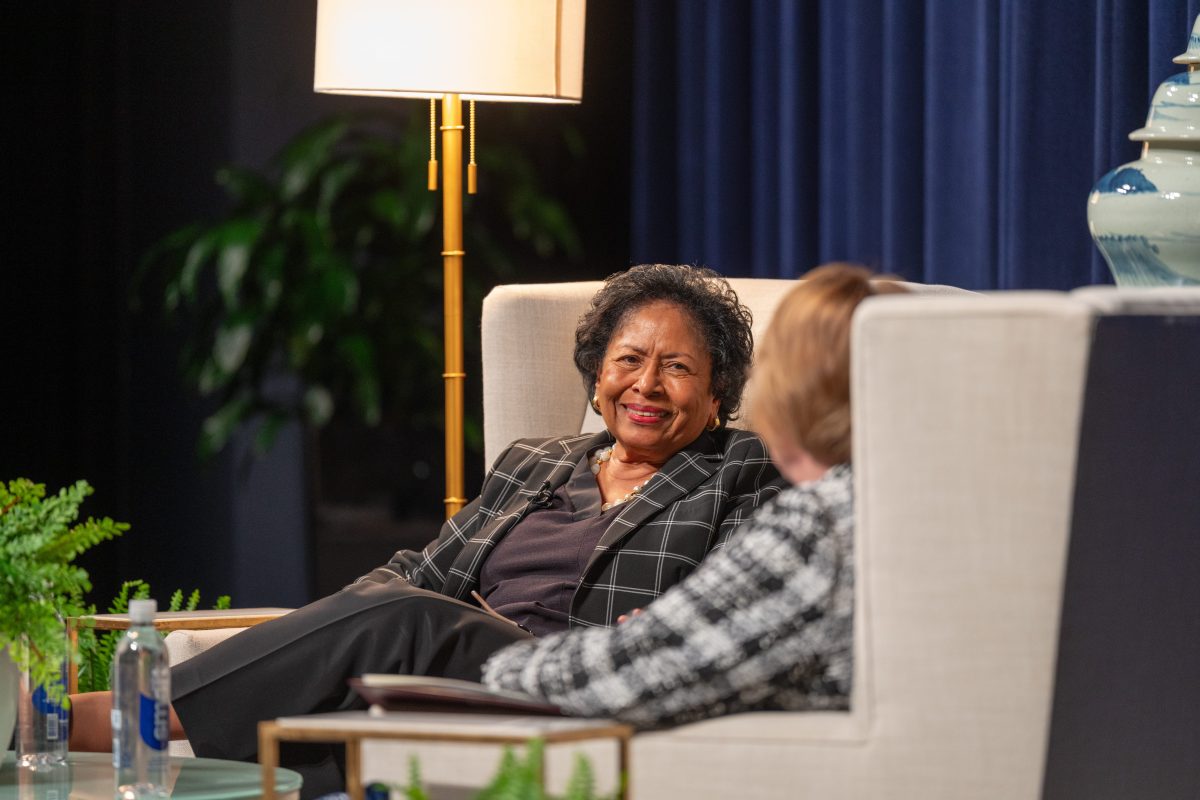On Feb. 29 and March 1, Trinity University hosted “Rooting Trinity University’s History: Past, Present & Future,” a series of lectures and discussions that marked the culmination of a project that began in the spring of 2018. The Roots Commission, a collaboration between administration and faculty, seeks to bring to light racism and injustice in Trinity’s history, particularly in regards to chattel slavery, which was inextricably linked to the Texas antebellum economy.
The conference’s first day featured a fireside chat and book signing with Ruth J. Simmons, whose storied career included a period as president of Brown University. At Brown, she pioneered the work of universities, examining their histories with slavery by forming the Steering Committee on Slavery and Justice in 2003, a legacy that Trinity is following as the third school in Texas to join the Universities Studying Slavery consortium.
“It was a simple thing for me, and yet it’s become this big thing that has led me to be involved in all kinds of projects around the world as a consequence of doing this very simple thing, which was to just tell the truth,” Simmons said.
Simmons’ investigation found that John Brown, whose fortune was tied to the founding of the university, was a slave trader and that the first president of Brown was an enslaver.
For a school like Trinity without any real mythology around a founding figure, as the speakers from the second day’s panels noted, the founders’ ties to white supremacy can be easier to overlook, making the acknowledgment of this history all the more important.
While Trinity’s founders themselves may not be given a lot of thought, the 1869 founding date and Tehuacana, the original location of the university, are key parts of Trinity’s identity that appear in many promotional materials. Erin Kramer, assistant professor of history, began the panels by addressing the problem with labeling 1869 as our origin. In putting so much focus on 1869, Trinity relegates the Tawakoni people who occupied Limestone County (where Tehuacana is located) to ancient history and ignores the history of settler colonialism that forced them out of Texas.
“When we say the name ‘Tehuacana’ and celebrate 150 years from our point of origin, we simultaneously call to mind the imaginary version of this native nation, while ignoring the present-day realities of native peoples,” Kramer said.
In that same period when the Tawakoni were being expelled from Texas, evangelist Christians in the Cumberland Presbyterian denomination were moving in. A majority of the Cumberland Presbyterians viewed manifest destiny as “God’s will” and supported slavery. Many of the major donors involved in Trinity’s founding were Cumberland Presbyterians.
This group of founders, according to records in the archives, was made up of enslavers and disseminators of Confederate propaganda. The end of slavery economically devastated the Trinity founders, but they still had each other, and as Sarah Beth Kaufman, associate professor of sociology and anthropology, explained, that was enough.
“This is a group of people who are doing what we call ‘opportunity hoarding,’” Kaufman said. “These are all names of people who are in our archives, and they’re connected through these multiple overlapping strong ties.”
Colleen Hoelscher, special collections librarian, and Lauren Turek, associate professor of history, reviewed Trinity’s commemorations, student publications such as the Trinitonian, marketing materials and other official sources to see how Trinity has chosen to remember its past. In earlier years, such sources idealized Trinity’s founding and failed to cover Trinity’s first African-American students and faculty or any issues of racial discrimination on campus. More recently, the hesitance to look into the unsavory parts of Trinity’s history has persisted, considering that maintaining the university’s reputation and esteem is beneficial to the whole of the Trinity community.
“The failure to acknowledge the ways in which the university benefited from the marginalization of African Americans and others allows for such mistreatment to continue into the present,” Turek said.
The work of the Roots Commission does not end with this conference, with the speakers making it clear that there are still more discoveries to be uncovered and discussions to be had about how we move forward with this knowledge. The conference ended with conversation circles designed to get ideas flowing about how Trinity could act on the work of the Roots Commission, such as aiding the Black community of Limestone County, as panelist Daniel Keeling suggested.
One of the key members of the Roots Commission was notably absent from the conference: Carey Latimore, Trinity history professor and associate minister for Mt. Zion First Baptist Church who passed away in summer 2022. In the introduction to the panels on Friday, Turek spoke of Latimore’s commitment to the power of history to forge reconciliation, the ultimate goal of the Roots Commission.
“Carey had faith — unshakable faith — that having that conversation would be healing and redemptive,” Turek said. “Engaging in the careful work of historical inquiry and truth-telling is one of the ways that we as a university can honor Dr. Latimore’s legacy.”
Categories:
Roots Commission tells the truth about history
Researchers elucidate the university’s history with white supremacy
More to Discover
About the Contributors

Sarah Fisher, Editor-in-Chief
Hello! My name is Sarah, and I’m a senior from Nashville, TN majoring in communication and Spanish with a minor in history. I’ve been with the Trinitonian since my first semester at Trinity, and I am so excited to serve as the Editor-in-Chief this year. In what little time I have outside of the newspaper, I’m the president of Trinity Mock Trial and a member of the film club.
I can’t wait to see what our staff accomplishes this year and for everyone to see their work as well!

Samuel Damon, Photographer
My name is Sam (he/him) and I’m a photographer here with the Trinitonian. I’m a senior Communications and German double major from Austin, Texas, and you can usually find me around campus with a camera in hand!








Dr. Deneese L. Jones • Mar 8, 2024 at 2:12 pm
When I commissioned this work, which included former Associate VPAA Michael Soto, I had faith that this Commission would unearth valuable truths that would create the needed dialogue to forge Trinity ahead of other private liberal arts institutions around issues of race, class, and gender. It is certainly a worthy venture. After asking simple questions about the full history of Trinity University, I was initially rebuffed by those who could not understand the vision. Now, I applaud the work of this group and encourage the involvement of others who may be skeptical or hesitant about what will be revealed.